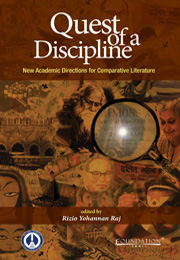Book contents
- Frontmatter
- Contents
- List of Contributors
- Acknowledgements
- Prologue to the “Quest'
- Introduction
- PART I Traditions and Manifestoes: Reflecting on Perspectives
- PART II The Quest Motif: Redefining the Scope of Comparative Literature
- PART III The Dynamics of Exchange: Genres, Areas and Disciplines
- PART IV India: A Curious Comparative Space
- 15 Towards a Compoetics in India: Alternative Frameworks for the Comparative Study of Poetics
- 16 The Relevance of Dalit Studies in the Creation of an Interdiscipline
- 17 Mother Tongue, The Other Tongue: Indianising English
- Afterword: Comparative? Literature?
- Index
16 - The Relevance of Dalit Studies in the Creation of an Interdiscipline
from PART IV - India: A Curious Comparative Space
Published online by Cambridge University Press: 05 June 2012
- Frontmatter
- Contents
- List of Contributors
- Acknowledgements
- Prologue to the “Quest'
- Introduction
- PART I Traditions and Manifestoes: Reflecting on Perspectives
- PART II The Quest Motif: Redefining the Scope of Comparative Literature
- PART III The Dynamics of Exchange: Genres, Areas and Disciplines
- PART IV India: A Curious Comparative Space
- 15 Towards a Compoetics in India: Alternative Frameworks for the Comparative Study of Poetics
- 16 The Relevance of Dalit Studies in the Creation of an Interdiscipline
- 17 Mother Tongue, The Other Tongue: Indianising English
- Afterword: Comparative? Literature?
- Index
Summary
INTRODUCTION
How do we address the issue of ‘curriculum development for Comparative Literature’ in India? The term ‘development’ in the title of the workshop would either suggest that the curriculum for Comparative Literature has not been developed yet or that there is a need for a revision of the current curriculum. If it is the former, it might mean that Comparative Literature has still not been offered as a ‘major’ discipline of study either at the postgraduate or undergraduate levels in many universities in India and therefore, there is a need to develop a curriculum for an emerging discipline. If it is the latter, it might mean that there is a crying need to address a revision of the discipline of Comparative Literature in such form as it exists now, mainly at the MPhil, and PhD, levels in Indian universities.
We would like to begin by addressing the pressing need to problematise the term ‘Comparative Literature’ in the Indian context. When literature worldwide is being studied in the context of various other disciplines like Gender Studies, Cultural Studies and Film Studies, can we talk any more of studying ‘literature’ in isolation? Also, how do we conceptualise Comparative Literature in a country that has a plethora of literatures preserved (orally or in the written form) in a multiplicity of languages?
Attempts to address the ‘crisis’ in the teaching of English Literature as a discipline some years ago resulted in expanding the scope of English Literature by admitting courses in Women's Studies, Cultural Studies, Film Studies etc. Consequently, we no longer refer to English Literature but to English Studies.
Information
- Type
- Chapter
- Information
- Quest of a DisciplineNew Academic Directions for Comparative Literature, pp. 247 - 256Publisher: Foundation BooksPrint publication year: 2012
